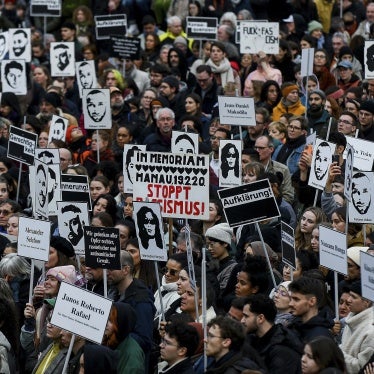June 22, 2018
Mr. Nouri Mahmoud
Spokesperson of the Peoples’ Protection Unit
Dear Mr. Mahmoud,
I am writing on behalf of Human Rights Watch to inform you about research we recently conducted in Northern Syria, and to request your official response. Human Rights Watch is an independent international organization documenting human rights abuses in more than 90 countries around the world. We have visited Northern Syria four times, most recently in May 2018, and have always welcomed the cooperation we received from the Democratic Union Party (PYD)-led Autonomous Administration.
During our most recent visit, we investigated a range of human rights abuses, among them the issue of child recruitment by forces affiliated with the PYD, now fighting under the umbrella of the Syrian Defense Forces (SDF). This is a violation that Human Rights Watch has documented in the past, and on which the People’s Protection Units and the Women’s Protection Units (YPG/J) have engaged on with us and other international organizations. In 2014, the YPG/J and the PYD-led Autonomous Administration signed a Deed of Commitment committing to end the use of child soldiers with Geneva Call, a non-governmental organization that promotes respect for international humanitarian law among non-state armed actors. Human Rights Watch also notes the YPG/J reservation to the Deed of Commitment on child soldiers, in which the YPG/J stated that children above the age of 16 may continue to be recruited but will not serve in combat roles, and are not authorized to take part either directly or indirectly in hostilities.
Human Rights Watch has a history of productive engagement with the YPG/J leadership and with the PYD-led Autonomous Administration on this issue, and notes the positive commitments made to end the recruitment and use of child soldiers. However, our recent research shows that the YPG/J continue to recruit and enlist both boys and girls for service in the armed forces. Moreover, we found that recruitment has been happening in displaced persons’ camps, targeting vulnerable families in need of social support or humanitarian assistance. We raised these issues during meetings with Autonomous Administration officials in Northern Syria in May 2018.
During our visit, we interviewed eight families who told us their children between the ages of 13 and 17 had been recruited by Asayish officers to join the YPG/J forces in Northern Syria, based on what other witnesses in the camps had told them and their conversations with officers or camp administration authorities. The families lived in al-Sad (Areesheh), al-Hol, and Ain Aissa camps. In most cases, the families only knew their children had gone for training, and did not know what role their child took, or would take, after they finished military training. In one case, the mother of a 16-year-old recruit said her son died while serving with the Syrian Democratic Forces in the operation to re-take the city of Raqqa, when the vehicle he was riding in struck a landmine. All of the families said their children chose voluntarily to attend training camps. However, they said their children were under the age of 18, and that they had not provided consent for them to receive training or join the YPG/J. All but one family told Human Rights Watch that they were denied contact with their child since they left for training. Human Rights Watch also interviewed two female recruits, both over the age of 18, who said that contact with their families was not permitted during their training period, which lasted three to four months.
In some cases, families told Human Rights Watch that their children enlisted after facing domestic problems. In these cases, Human Rights Watch recommends that authorities provide children with social support from civilian agencies, rather than encouraging or facilitating recruitment under the age of 18 as a solution. Internally displaced children may be at greater risk of recruitment, and those who enlist are at greater risk of remaining separated from their families and communities, as noted in the Paris Principles on Children Associated With Armed Forces or Armed Groups.
As you know, International humanitarian law and international human rights law ban government forces and non-state armed groups from recruiting and using children as fighters and in other support roles. The Optional Protocol to the Convention on the Rights of the Child, which Syria ratified in 2003, bans non-state armed groups from recruiting or using children under age 18 in direct hostilities. Conscripting or enlisting children under 15, including for support roles, is a war crime under the Rome Statute of the International Criminal Court.
Human Rights Watch will be publishing our research findings on child recruitment in Northern Syria, and requests your response on the following by July 4, in order to include your response in our publication.
- What procedures do the YPG/J currently have in place to verify the age of those who wish to join their ranks? What procedures are in place to ensure that children do not take up combat roles?
- What is the policy of the YPG/J on recruiting from displaced persons’ camps?
- What measures are in place to penalize or prosecute YPG/J officers who allow children 15 and under to serve under them or 16 and older to serve in combat roles? To date, how many YPG/J officers have been punished for allowing children to serve unlawfully?
- What measures are taken to ensure parental consent of those children wishing to receive training and join the YPG/J? What is the policy on whether recruits can communicate with their families? Is there a different policy for recruits under the age of 18?
- Does the YPG/J currently have any plans to revoke its reservation to the Deed of Commitment which currently permits children above age 16 to enlist, and raise the minimum age of recruitment to the international standard of 18 years? Human Rights Watch would welcome such a development.
Thank you in advance for any information you can provide.
Sincerely,
Priyanka Motaparthy
Acting Director
Emergencies Division
Human Rights Watch








